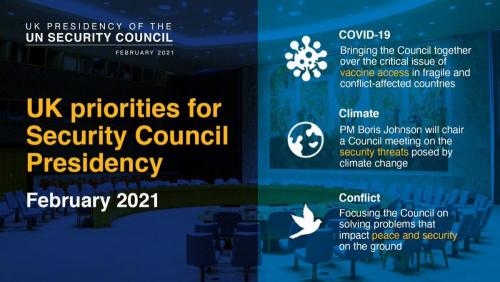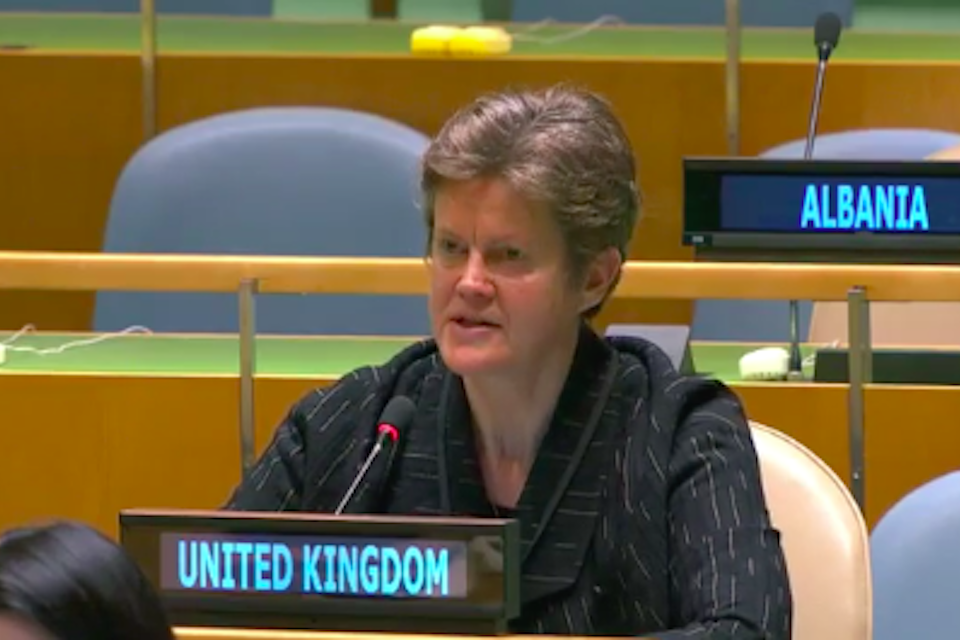
Press Conference by Security Council President on Programme of Work for February
https://www.un.org/press/en/2021/210201_SC.doc.htm
The Security Council’s agenda for February will feature two major meetings — one on climate security risks and the other on equitable access to COVID-19 vaccines in conflict-affected areas, its President for the month said during a video press conference today.
Briefing on the organ’s February programme of work, Council President Barbara Woodward (United Kingdom) said her delegation will focus on three “Cs” — climate, COVID-19 and conflict — and bring in the perspectives of youth as many global challenges are intergenerational. Her delegation also aims to make the organ’s work as transparent as possible.
The high-level open meeting on security risks in climate–vulnerable contexts, scheduled for 23 February, will be chaired by Prime Minister Boris Johnson and explore the linkages between climate and security, she said, citing the Secretary-General of the United Nations as saying “making peace with nature is the defining task of the twenty-first century”.
On 18 February, Foreign Secretary Dominic Raab will chair a briefing on equitable access to COVID-19 vaccines. “No one is safe until everyone is safe,” she said, explaining that the meeting will consider the security implications of COVID‑19 vaccines not rolled out in conflict-affected areas.
On conflict, she said the Council will hold meetings on Syria’s chemical weapons programmes, political and humanitarian situations, respectively, on 3, 9 and 25 February. On Myanmar, the Council will convene closed consultations on 2 February, given the developments in that country over the weekend.
On 10 February, the Council will hear a biannual briefing on terrorist threats, particularly those posed by Islamic State in Iraq and the Levant (ISIL/Da’esh). The issue of prosecuting foreign terrorist fighters will be addressed in the meeting.
Also on the agenda are a monthly update on Yemen on 16 February and a quarterly update on the United Nations Assistance Mission for Iraq (UNAMI) on 17 February. Several meetings are scheduled on Somalia, including for renewing the mandate of the African Union Mission in Somalia (AMISOM). Briefings on Haiti and the Central African Republic will be held, respectively, on 22 and 24 February. A quarterly update on the Democratic People’s Republic of Korea will be addressed in a closed meeting on 25 February.
Responding to questions about the Council’s consideration of Myanmar, she said that the meeting will be closed to allow for frank discussion and the agenda is yet to be finalized. Asked if sanctions are being considered, she said that the Council will discuss a range of measures that could help efforts to release civilian and civil society leaders, including State Counsellor Aung San Suu Kyi, and bring that country back to democracy. As opposed to what individual countries might do bilaterally, the Council will discuss measures at its disposal, she added. Even prior to the coup d’état, the United Kingdom was planning to put Myanmar on the agenda as there had been allegations related to elections and other developments since the last Council meeting on that country in September 2020. In the end, Council members agreed to move up the meeting from 4 to 2 February due to developments over the weekend.
On a question about the detention of opposition leader Alexei Navalny by the Russian Federation’s authorities, she said the issue is not on the agenda, but drew attention to the statement issued by the Group of Seven industrialized countries.
On Somalia, she said that, with the 8 February deadline for holding elections approaching, not holding the polls will increase the risks to security and stability there. In addition, peacekeepers will be under additional pressure, she added.
For the full programme of work, please see: www.un.org/securitycouncil/events/calendar.
Press Confernce of Ambassador Barbara Woodward, Permanent Representative of the United Kingdom to the United Nations and President of the Security Council for the month of February on the programme of work of the Council in February 2021: https://www.youtube.com/watch?v=gkzAfEfAzwI
For more info: https://www.reuters.com/article/us-climate-un-britain/uks-johnson-to-cha...
Ensuring the UN is fit for purpose in 2021 and beyond
Statement by Ambassador Barbara Woodward at the General Assembly Debate on the “Report of the Secretary-General on the work of the Organization”

Mr President, Secretary General, thank you for joining us today and for outlining your priorities for the year ahead. The UK was honoured to host your first virtual visit of 2021. The visit marked how far the UN has come since those first meetings in London 75 years ago. We hope to welcome you in person soon.
Secretary General, in its 75th anniversary year, the UN faces a pivotal moment. As you said, a transition from annus horribilis to a year of hope and opportunity. Your ten challenges are clear. I will comment on three.
On COVID-19, we need to agree a pathway out of this crisis and build a more resilient and responsive pandemic preparedness system for the future. The UK is committed to working with you in your call for the urgent funding needed to ensure COVAX reaches its targets for 2021, and vaccines reach all who need them.
Second, on climate, we have, as you say, to drive up ambition across all climate and environmental issues. As incoming COP26 President, we are committed to working with all partners to secure a balanced, negotiated package that keeps the goals of the Paris Agreement within reach and delivers for the most vulnerable.
Third, both COVID and climate increase the risk of conflict and its humanitarian impacts, which you set out: famine, migration, sexual violence and many more. The UK will use our Security Council Presidency next month to focus on conflict and hunger. We need to be better, as you said, at anticipating crises, and we must acknowledge that humanitarian crises require political solutions. The UK will continue to be a committed humanitarian donor and calls on others to step up at this time of great need.
In order to achieve our objectives we need to continue your ambitious reform agenda. We need a UN that is inclusive and fit for purpose. The UK is committed to working closely with you and the membership to get us there. Finally, Secretary General, may I thank you for the leadership you have shown during your tenure, particularly this past year. As my Prime Minister has already said, the UK fully supports your decision to run for a second term.
Secretary General, my question is on climate finance. Increasing the quantity and predictability of climate finance is a priority for the UK’s COP26 Presidency. We are calling on all donor countries to commit to increased post-2020 finance commitments to achieve and surpass the $100 billion goal, which is critical for developing countries. But as your recent report made clear, we are some way off meeting the $100 billion commitment. What steps must the international community take now to ensure we meet this commitment in 2021?
Thank you.










Add new comment